Overview
In 2025, the world of Chief Operating Officer (COO) compensation presents a complex landscape, encompassing:
- Base salary
- Bonuses
- Equity
- Various benefits
Total compensation could potentially reach around £138,517.
We understand that navigating this intricate structure can be challenging, and it’s essential to grasp these components fully. Factors like company size, industry, and geographical location play a significant role, influencing not just the numbers but also the career paths of aspiring COOs.
By understanding these elements, you can empower yourself to negotiate effectively and make informed decisions about your future.
Introduction
In the competitive arena of corporate leadership, we understand that grasping the intricacies of Chief Operating Officer (COO) compensation can feel overwhelming for aspiring professionals. As organizations evolve, so too do the structures of remuneration, which encompass base salaries, bonuses, equity options, and a variety of benefits that reflect both individual performance and the success of the company.
With projections indicating that total COO compensation in the UK could reach impressive heights, navigating this landscape requires not only an awareness of current trends but also a thoughtful approach to negotiations.
This article delves into the key components of COO compensation packages, the factors influencing salary variations across industries, and effective strategies for negotiating a competitive salary.
Our aim is to empower future COOs to maximize their earning potential and advance their careers, fostering a supportive community along the way.
The Basics of Chief Operating Officer Compensation
In 2025, the chief operating officer compensation in the UK presents a multifaceted structure that encompasses base pay, bonuses, equity, and various benefits. We understand that aspiring professionals may feel overwhelmed by these complexities. The average base compensation for a COO is anticipated to be around £92,160. However, when factoring in bonuses and equity, the total compensation can rise to approximately £138,517, reflecting the significant financial incentives tied to performance and company success.
Recognizing the components of chief operating officer compensation is crucial for those looking to advance their careers and negotiate salaries. Bonuses, for instance, are a substantial part of the pay package, with chief operating officer compensation in London featuring an average bonus of £94,235. This highlights the competitive nature of the role and the importance of aligning individual performance with organizational goals.
Current trends in chief operating officer compensation packages reveal a growing emphasis on equity stakes, especially within tech firms where rapid growth and innovation are prevalent. This trend not only motivates COOs to enhance company performance but also aligns their interests with those of shareholders. Real-world examples from leading tech companies illustrate that chief operating officer compensation frequently includes diverse pay packages featuring performance-based bonuses and stock options, further enriching the overall remuneration landscape.
As the market evolves, the need for accurate pay benchmarking becomes increasingly essential. Recent data indicates that salary ranges for roles such as Chief Customer Officer, Chief Commercial Officer, and Chief Revenue Officer are comparable to those of Chief Operating Officers, underscoring the competitive environment for top executive talent. This is particularly relevant for members of fff.club, who can draw upon insights from their peers to better understand these payment frameworks and trends.
Grasping these payment structures and current trends is vital for aspiring COOs, as understanding chief operating officer compensation equips them with the knowledge needed to navigate their career paths effectively. By engaging with fellow members of fff.club, individuals can share experiences and strategies related to remuneration, deepening their understanding of the market. As Taavi Roivas, former Prime Minister of Estonia, emphasizes, having access to a community of knowledgeable professionals can significantly influence one's approach to career development and salary negotiation.
By leveraging insights from industry leaders and case studies, individuals can position themselves for success in the ever-evolving landscape of tech leadership.
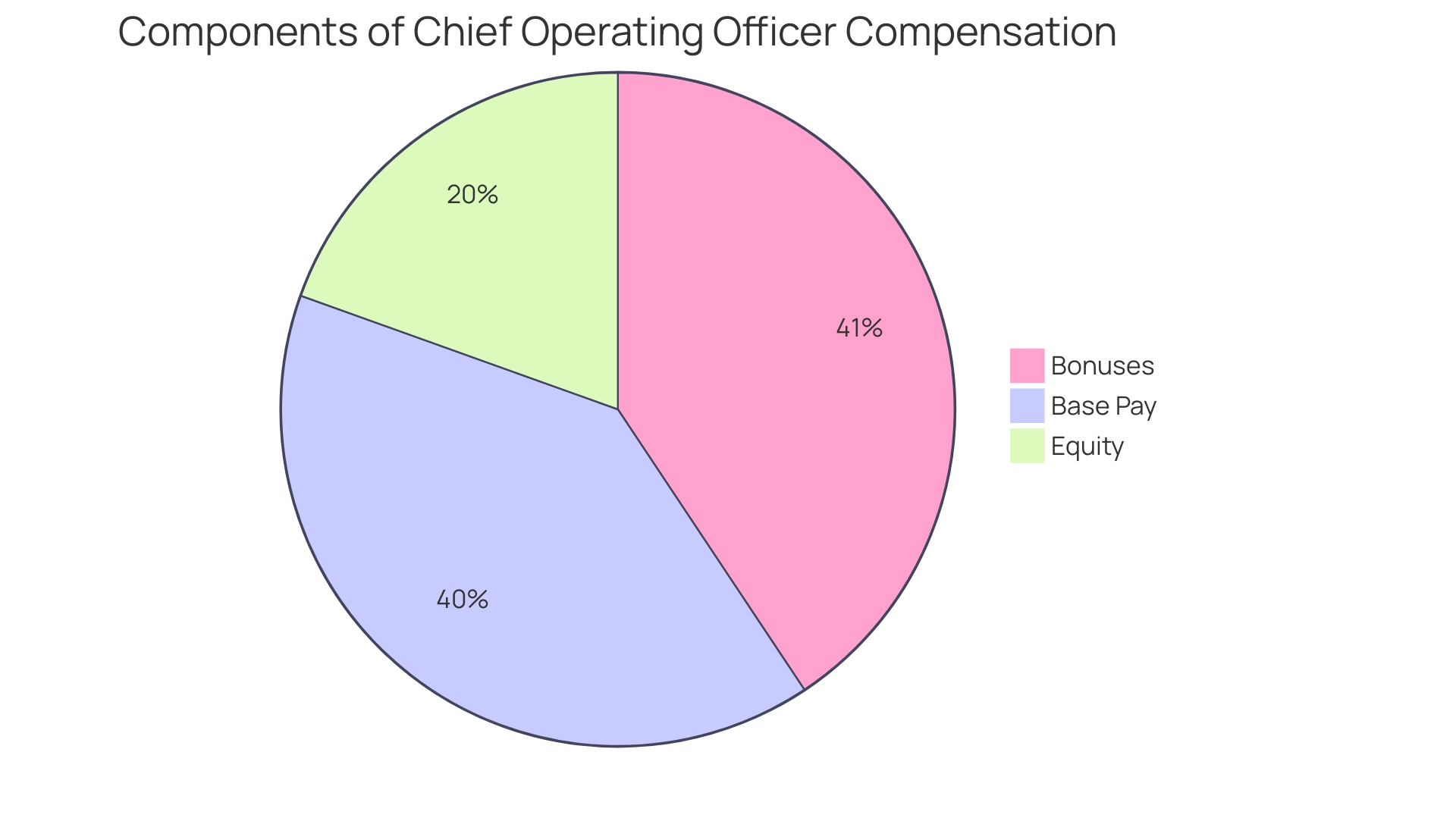
Key Factors Influencing COO Salaries
Several critical factors shape chief operating officer compensation, including company size, industry, geographical location, and individual experience. In 2025, many chief operating officers in larger organizations or high-demand sectors, such as technology, can expect greater compensation. For instance, in London, Chief Operating Officers may anticipate an average bonus of £94,235, highlighting the competitive nature of the market in major urban centers.
Geographical location significantly influences chief operating officer compensation. Those in metropolitan areas often receive higher payments to offset the elevated cost of living. We understand that this trend is essential for aspiring COOs to consider when assessing job opportunities and compensation expectations.
Moreover, the size of the company plays a pivotal role in determining chief operating officer compensation. Larger firms typically offer more substantial remuneration packages, including bonuses and stock options, compared to smaller startups. This disparity underscores the importance of understanding how company size correlates with chief operating officer compensation, empowering candidates to make informed decisions during their job search.
Expert analysis indicates that experience level also influences chief operating officer compensation in negotiations. Executives with a demonstrated history in leadership positions or specialized knowledge in their field can leverage their expertise to negotiate better compensation, regardless of their current income level. This insight is crucial for aspiring chief operating officers to comprehend the landscape of chief operating officer compensation and maximize their earning potential.
As noted by Mihkel Torim, the club's commitment to equipping members with the necessary insights and resources to make informed decisions is vital for career advancement.
In the tech industry, factors such as company growth stage and funding status further impact chief operating officer compensation. For instance, a COO at a well-funded startup may earn significantly more than one at an early-stage company, reflecting the varying financial capabilities of different organizations. Understanding these dynamics can empower aspiring chief operating officers to navigate their career paths strategically and effectively, particularly concerning chief operating officer compensation.
Additionally, the emphasis on community involvement and education, as articulated by founder Akim Arhipov, reinforces the importance of these elements in helping aspiring chief operating officers succeed in their careers.
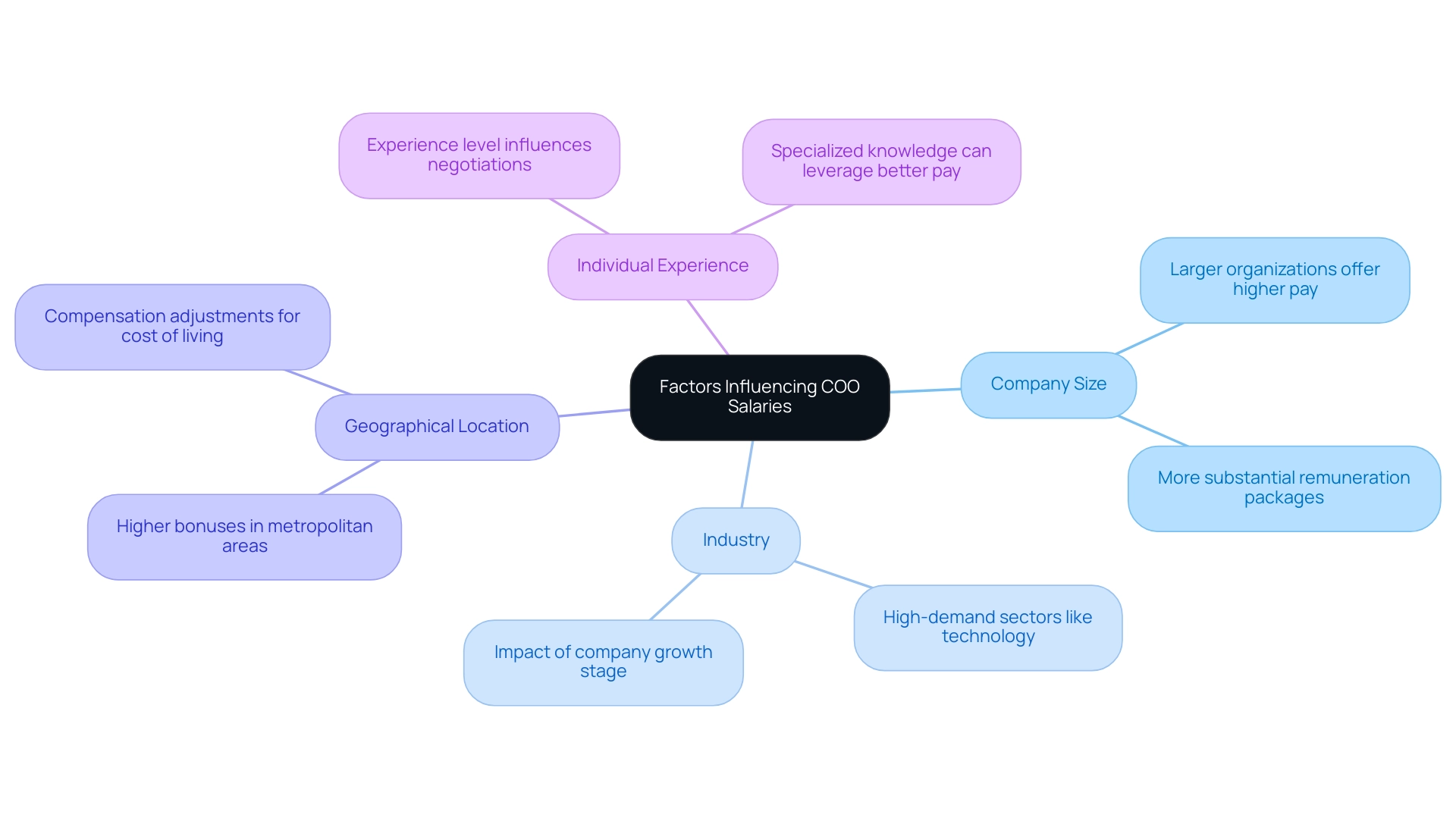
Comparative Analysis of COO Salaries by Industry
Chief operating officer compensation varies significantly across different industries, reflecting the unique demands and financial capabilities of each sector. In 2025, chief operating officer compensation for those in the technology sector is projected to range between £120,000 and £300,000, showcasing the lucrative opportunities that await in this fast-paced field. In stark contrast, individuals in non-profit organizations typically earn around £80,000, illustrating a significant pay gap that can influence the career decisions of aspiring chief operating officers.
This disparity is not just a reflection of the industries themselves but also of the responsibilities and expectations placed on chief operating officers within these environments. In the tech sector, the responsibilities of fostering innovation, overseeing intricate operations, and ensuring scalability are significant factors contributing to compensation. Conversely, non-profit Chief Operating Officers often prioritize mission-driven goals, which can limit the financial resources available for compensation.
Furthermore, the average gross income for chief operating officer compensation in London stands at £238,328, which is 22% above the national average for Chief Operating Officers throughout the UK. This figure is complemented by an average bonus of £94,235, further emphasizing the financial rewards associated with leadership roles in the technology sector.
Real-world examples illustrate these trends: industry leaders, such as Mihkel Torim from LHV, have shared insights into their remuneration packages, reinforcing the notion that technology firms prioritize competitive pay to attract top talent. Additionally, the community aspect of fff. Club enhances the investment experience by enabling members to co-invest and learn from one another, which is vital for aspiring COOs navigating their career paths.
As the landscape evolves, understanding the dynamics of chief operating officer compensation becomes essential for those looking to advance in their careers. Taavi Roivas, ex-Prime Minister of Estonia, underscores the importance of grasping compensation trends in the tech sector, empowering individuals to make informed decisions about their career paths and industry choices.
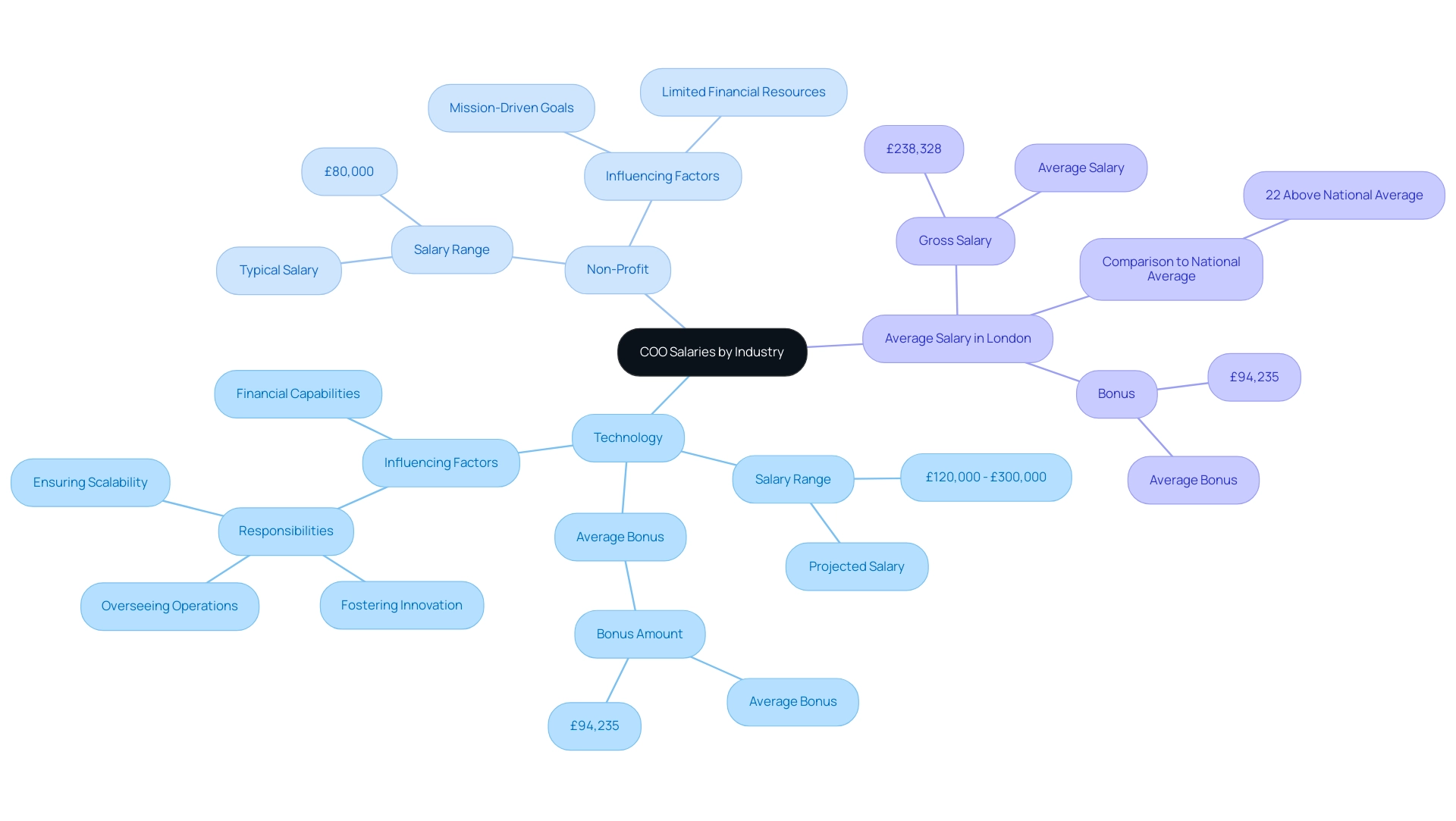
Understanding COO Compensation Packages: Beyond the Base Salary
A Chief Operating Officer's (COO) compensation package is multifaceted, encompassing more than just a base pay. In 2025, the typical COO compensation is anticipated to be around £150,000, which includes a base salary, performance bonuses, stock options, retirement plans, and health benefits. For many, a common breakdown might be a base pay of £100,000, complemented by £30,000 in performance bonuses and £20,000 in stock options, leading to a total remuneration of £150,000.
Understanding the elements of COO compensation packages is vital for aspiring Chief Operating Officers, as these factors play a significant role in negotiations. Beyond the base salary, performance bonuses are often tied to specific company objectives, motivating COOs to drive organizational success. Many of our members have experienced the challenges in aligning personal goals with business objectives. In fact, a statistic reveals that 25% of nearly 500 revenue leaders identified 'alignment to business goals' as the area needing the most improvement in sales management, underscoring the importance of performance-based incentives.
Stock options offer a stake in the company's future, aligning the interests of the COO with those of shareholders. Additionally, retirement plans and health benefits enhance the overall appeal of the remuneration package, ensuring long-term financial security and well-being for COOs and their families.
Expert opinions emphasize the importance of negotiating beyond the base salary in the context of COO compensation. As Jason Brooks, a leader in remuneration consulting, notes, the trend in pay practices shows a growing emphasis on long-term incentives (LTIs) as a significant portion of total earnings. The BDO 600 annual study revealed increases of 4.2% in total direct remuneration for CEOs and 0.7% for CFOs, with a notable rise in LTIs. This reflects a broader recognition that aligning pay with performance and company success is essential for attracting and retaining top talent, something we all aspire to achieve.
Moreover, the legal context surrounding COO remuneration is crucial to consider. Under the Sarbanes-Oxley Act (SOX), CEOs and CFOs are subject to clawback provisions, necessitating reimbursement of incentive payments if an accounting restatement is due to misconduct. This adds a layer of accountability to remuneration structures, ensuring that fairness prevails.
Case studies indicate that comprehensive COO compensation packages are increasingly supported by shareholders. For instance, in 2024, support for equity plan proposals surged, with only 0.5% receiving less than majority approval, indicating strong backing for performance-based remuneration structures. This trend highlights the significance of developing remuneration packages that include COO compensation, ensuring they align with industry standards and resonate with the expectations of stakeholders.
In the tech sector, examples of COO remuneration packages often feature innovative elements that extend beyond conventional pay structures. Companies are recognizing that investing in employee development is linked to greater profitability and higher retention rates. By understanding the full spectrum of COO compensation, aspiring COOs can negotiate effectively and maximize their earnings potential in a competitive landscape, fostering a supportive community that values growth and collaboration.
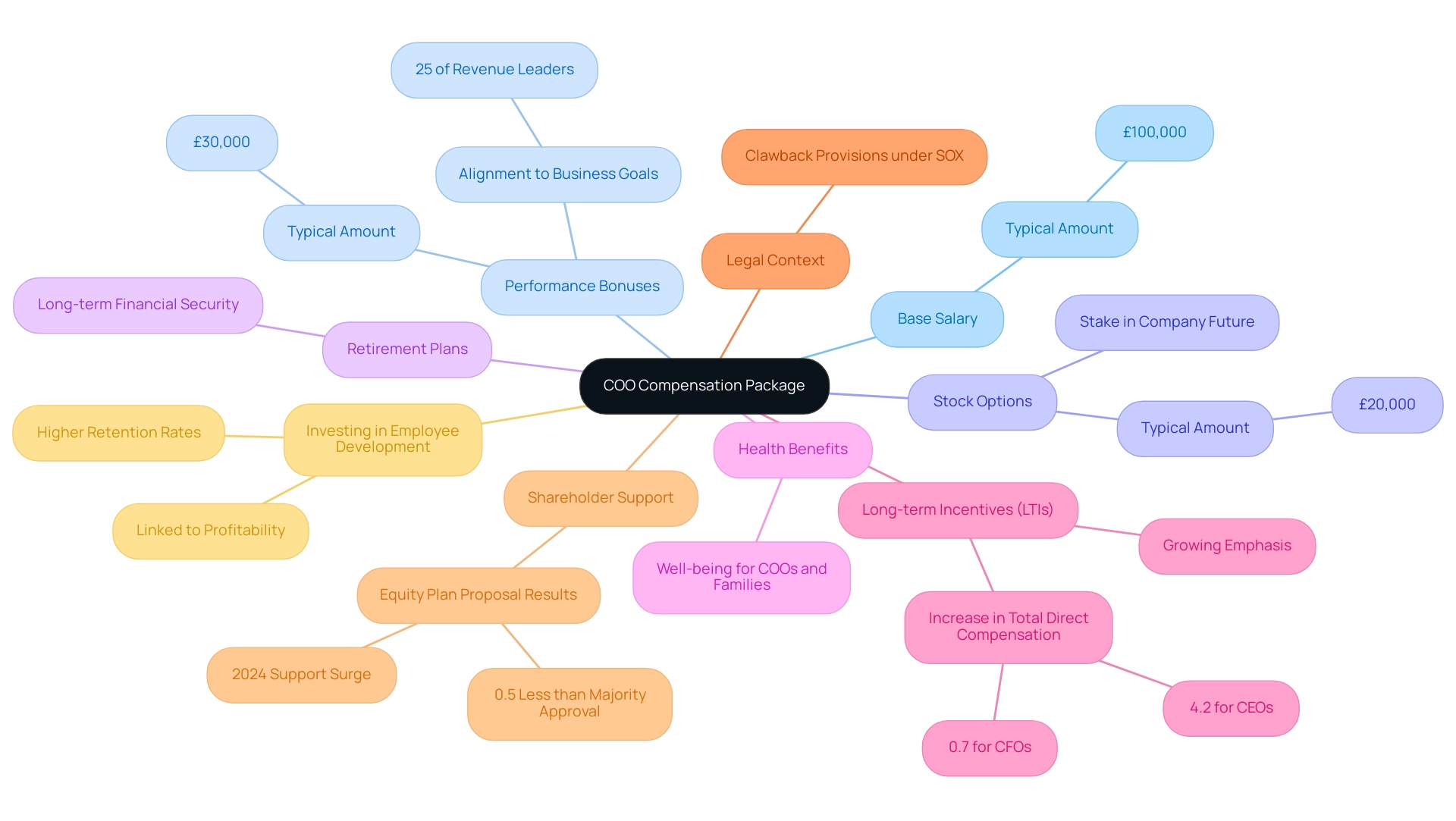
Negotiating Your COO Salary: Strategies for Success
Negotiating chief operating officer compensation can feel daunting, but with a strategic approach grounded in thorough research and self-advocacy, you can navigate this process with confidence. As you begin, take a moment to examine industry norms for chief operating officer compensation in 2025. Utilize resources that provide insights into average earnings for comparable positions within your sector. This foundational knowledge will empower you to present a compelling case during negotiations.
Key strategies to consider include:
- Articulate Your Value: It’s essential to clearly communicate your unique skills, experiences, and the specific contributions you can make to the organization. Tailor your pitch to align with the company's goals and challenges, demonstrating how your leadership can drive success. Remember, as many of our members have experienced, a well-articulated value proposition can make a significant difference.
- Utilize Data: Presenting data on average salaries and benefit packages for COOs in similar companies not only substantiates your request but also positions you as an informed candidate who understands market dynamics. For instance, being part of a community like fff.club, which boasts over 410 tech professionals, can provide valuable insights into salary trends and empower you with the knowledge needed to negotiate effectively.
- Flexibility in Compensation: Being open to discussing various components of the compensation package, including bonuses, stock options, and benefits, can lead to a more advantageous overall proposal. Flexibility can result in a more satisfying outcome, even if the base compensation is not as high as you initially hoped.
- Practice Negotiation Tactics: Engaging in mock negotiations can significantly enhance your confidence and effectiveness. Consider role-playing scenarios with a mentor or peer to refine your approach and anticipate potential counterarguments.
Alongside these strategies, staying informed about current compensation trends is crucial. A case study titled "Importance of Competitive Salaries in Talent Retention" underscores that organizations must offer fair compensation to attract and retain top talent. This insight reinforces the necessity of being well-prepared for discussions concerning chief operating officer compensation. Mihkel Torim has noted the club's commitment to equipping members with the necessary insights and resources to make informed decisions.
As you navigate the negotiation process, remember that expert advice can be invaluable. Negotiation specialists often emphasize the importance of preparation and adaptability in discussions. Additionally, consulting firms like Michael Page offer tailored recruitment solutions that can help you stay informed on salary negotiation trends.
By equipping yourself with knowledge and employing effective strategies, you can enhance your chances of securing a benefits package that reflects your worth and aligns with industry standards. Furthermore, fostering an inclusive approach to remuneration aligns with the belief that financial superpowers should be accessible to everyone, enhancing the overall investment experience through the supportive network at fff.club.
To further empower your negotiation journey, we invite you to Book a call with our experts at fff.club. Connect with fellow tech investors, stay updated with market trends, and explore co-investing opportunities that can elevate your financial strategies.
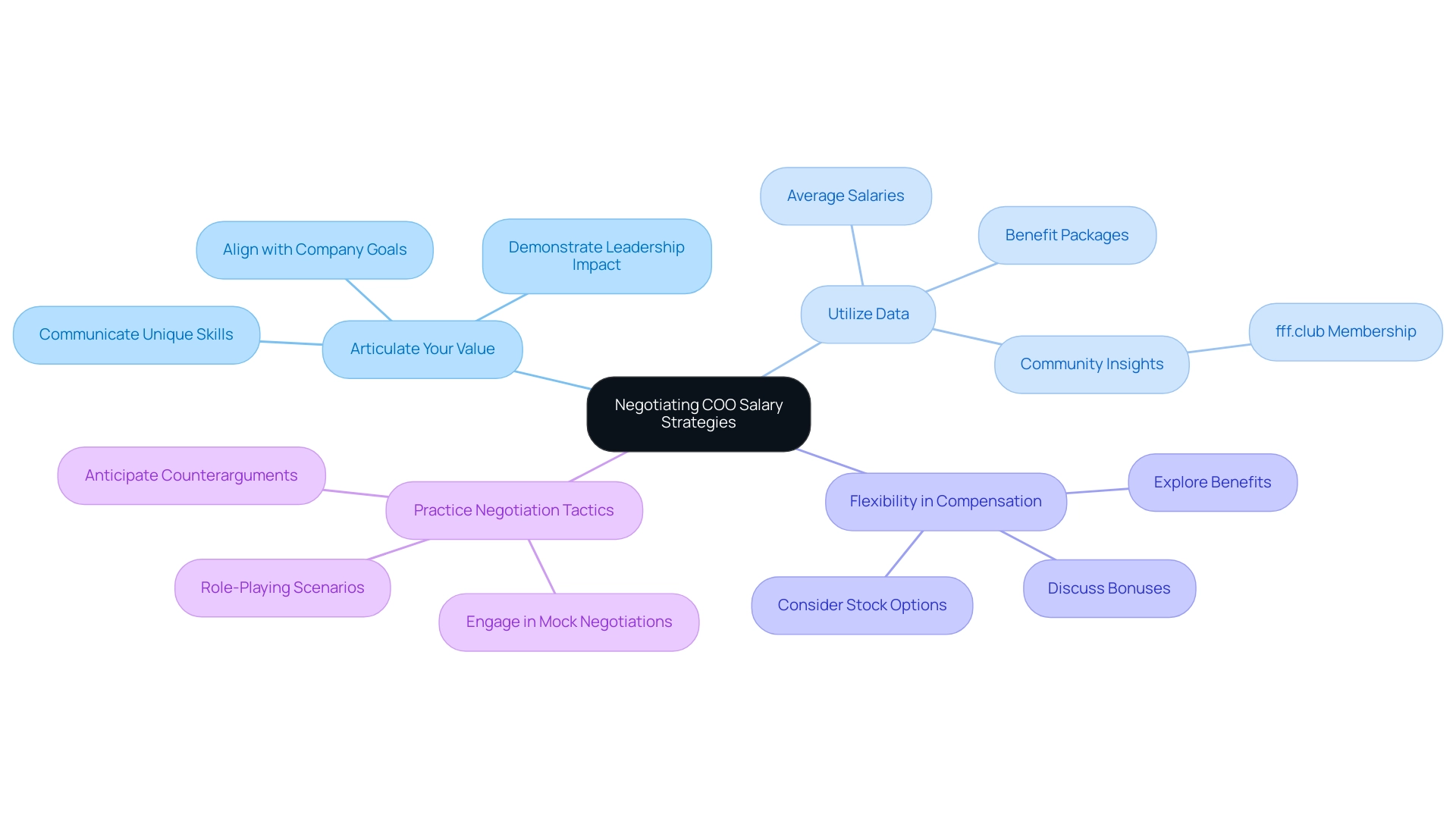
Staying Informed: The Evolving Landscape of COO Compensation
The landscape of chief operating officer compensation is undergoing significant transformation, influenced by various market trends, economic conditions, and evolving corporate governance practices. As we move into 2025, we understand that aspiring COOs face the challenge of staying informed about the latest salary reports and industry developments. Recent data indicates a notable increase in the use of variable reward programs, with organizations expected to see a 14% growth in recognition programs and a 6% rise in equity rewards. This shift highlights the increasing focus on performance-based and budget-flexible remuneration strategies.
Engaging with professional networks and communities, such as those found in platforms like fff.club, can provide invaluable insights into these trends. Many members have shared experiences that foster connections, which may lead to improved financial opportunities. The club's dedication to inclusivity, as expressed by founder Akim Arhipov, strengthens the notion that financial superpowers should be available to all. This sentiment is especially pertinent in conversations about remuneration.
Additionally, the influence of economic circumstances on COO pay cannot be ignored. For example, the ISS 'Against' recommendation rate for equity plan proposals has increased to 29.5% in 2024, indicating a more careful approach to remuneration structures. Bill Reilly, Managing Director at Pearl Meyer, notes, "On a general level, the findings from the Pearl Meyer survey reflect a marked resiliency within the labor market," highlighting the importance of understanding these dynamics.
Furthermore, understanding how market influences affect chief operating officer compensation is essential. Publicly traded companies often value their voting securities at the higher of market price or acquisition price, while non-publicly traded entities may rely on acquisition price or fair market value. This distinction can greatly influence chief operating officer compensation and should be a consideration for aspiring Chief Operating Officers.
By actively participating in discussions and leveraging the collective knowledge within their networks, aspiring COOs can navigate the complexities of compensation trends and position themselves for success in an ever-evolving landscape.
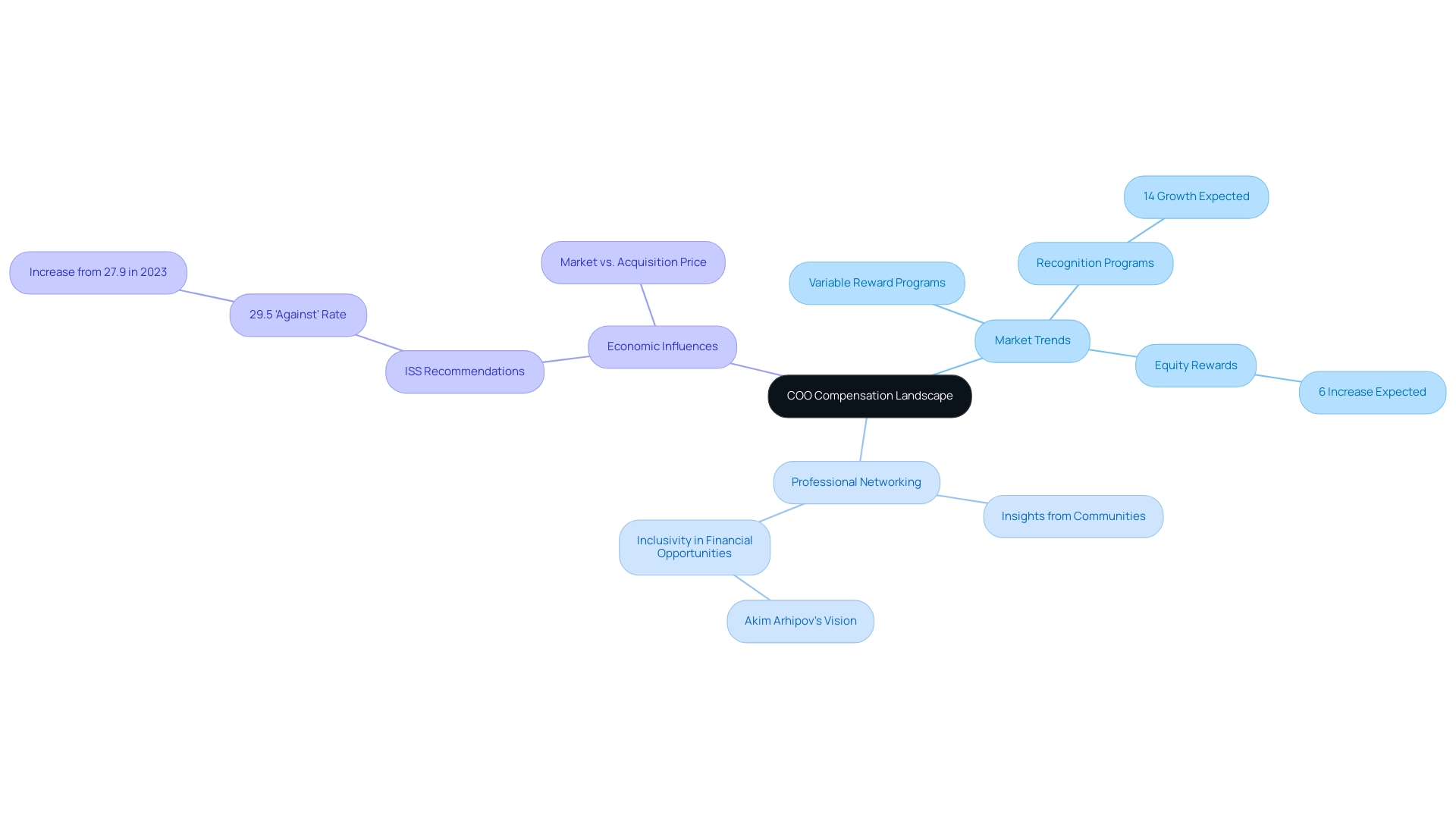
Conclusion
The landscape of Chief Operating Officer (COO) compensation can feel intricate and ever-evolving, filled with various components such as base salaries, bonuses, equity, and benefits. We understand that aspiring COOs must navigate this multifaceted nature of their potential compensation packages, which can significantly influence their career trajectories. The projected average total compensation of approximately £150,000 highlights the financial rewards associated with this pivotal role, especially in high-demand sectors like technology.
Key factors influencing COO salaries often include:
- Company size
- Industry
- Geographic location
- Individual experience
For instance, many of our members have experienced how COOs in metropolitan areas command higher salaries to offset living costs, while those in larger organizations typically enjoy more substantial compensation packages. Understanding these dynamics is crucial for candidates looking to maximize their earning potential and make informed career decisions.
Moreover, we emphasize the importance of effective negotiation strategies. By articulating their unique value, leveraging market data, and being flexible with compensation components, aspiring COOs can enhance their prospects during salary discussions. Engaging with professional networks, such as fff.club, can provide valuable insights and foster connections that empower individuals in their negotiation journeys.
As the corporate landscape continues to change, staying informed about trends and shifts in COO compensation remains essential. By actively participating in community discussions and utilizing available resources, future COOs can navigate the complexities of their compensation packages and position themselves for success in a competitive environment. Embracing these insights not only prepares them for effective negotiations but also equips them with the knowledge to advance their careers strategically.



